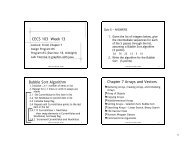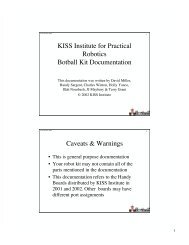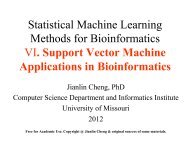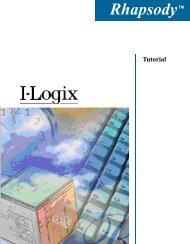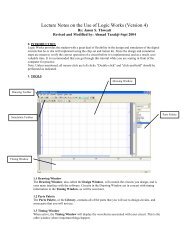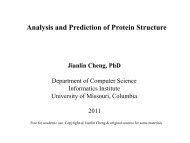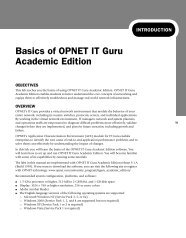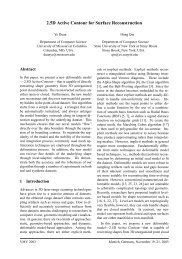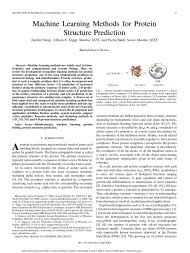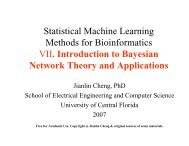Chapter X: Introduction to Fuzzy Set Theory Uncertainty is universal ...
Chapter X: Introduction to Fuzzy Set Theory Uncertainty is universal ...
Chapter X: Introduction to Fuzzy Set Theory Uncertainty is universal ...
You also want an ePaper? Increase the reach of your titles
YUMPU automatically turns print PDFs into web optimized ePapers that Google loves.
that contains 14 position papers covering various aspects of the role and future prospects of fuzzy sets<br />
[Dubo<strong>is</strong>, 2005].<br />
The mathematical bas<strong>is</strong> for formal fuzzy logic can be found in infinite-valued logics, first studied by the<br />
Pol<strong>is</strong>h logician Jan Lukasiewicz in the 1920s (see [Borkowski, 1970]). Lukasiewicz constructed a series<br />
of multi-valued logical systems, generalizing from small finite numbers of truth-values <strong>to</strong> those<br />
containing infinite sets of truth values. H<strong>is</strong> work and calculation formulae are ingrained in modern fuzzy<br />
set theory and fuzzy logic, the genes<strong>is</strong> of which <strong>is</strong> credited <strong>to</strong> Zadeh in h<strong>is</strong> seminal three part treat<strong>is</strong>e on<br />
the theory and applications of lingu<strong>is</strong>tic variables [Zadeh, 1975a; Zadeh 1975b; Zadeh 1976].<br />
Perhaps the biggest boost <strong>to</strong> the v<strong>is</strong>ibility and perceived utility of fuzzy set theory came from the<br />
application of rule-based fuzzy systems <strong>to</strong> problems in control [Mamdani and Assilian, 1975; Mamdani,<br />
1977; Takagi and Sugeno, 1985; Sugeno, 1985, Verbruggen and Babuska, 1999, Passino and Yurkovich,<br />
1998]. In what has become commonplace now, sets of lingu<strong>is</strong>tically described rules were created and<br />
inserted in<strong>to</strong> a variety of non-linear control systems. The ease of design and the smoothness of the<br />
control surface from only a handful of rules made fuzzy controllers very popular in a variety of products<br />
from the au<strong>to</strong>motive industry, consumer electronics markets, etc. <strong>Fuzzy</strong> controllers are well suited for<br />
low-cost embedded systems.<br />
While the big economic impact of fuzzy set theory and fuzzy logic centers on control, particularly in<br />
consumer electronics, there has been, and continues <strong>to</strong> be, much research and application of these<br />
technologies in pattern recognition, information fusion, data mining, and au<strong>to</strong>mated dec<strong>is</strong>ion making<br />
[Bezdek et al., 1999, Keller et al., 1996]. There are national, multi-national, and international fuzzy<br />
systems professional societies around the globe whose purposes are <strong>to</strong> foster research, development and<br />
application of fuzzy set theory and fuzzy logic. <strong>Fuzzy</strong> systems are one of the core pillars of the IEEE<br />
Computational Intelligence Society.<br />
An introduction <strong>to</strong> the key components of fuzzy set theory and fuzzy logic <strong>is</strong> now given with the view<br />
<strong>to</strong>ward computational methods of use in bioinformatics. After a d<strong>is</strong>cussion of the general principles of<br />
fuzzy set theory, membership functions and fuzzy connective opera<strong>to</strong>rs, we focus on those areas for<br />
which we present specific applications within bioinformatics: fuzzy logic rule based systems, fuzzy<br />
clustering, fuzzy classifiers, particularly, the <strong>Fuzzy</strong> K-Nearest Neighbor algorithm, fuzzy measures and<br />
the fuzzy integral. The reader <strong>is</strong> referred <strong>to</strong> [Klir and Yuan, 1995; Bezdek et al., 1999] for more<br />
extensive development of the theory and selected applications.



